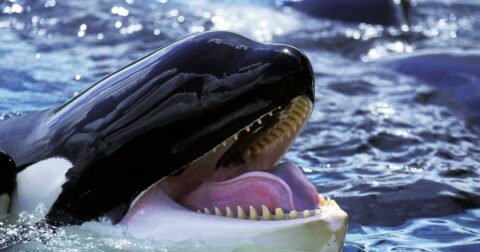News
GLP-1 Users Lose Weight, and Their Taste for Meat
Research•3 min read
Explainer
A series of seemingly coordinated attacks against fishing vessels has the public paying attention to orcas. Here’s what you need to know about this remarkable species.


Words by Björn Ólafsson
Starting in 2020, and intensifying throughout 2023, orcas have unleashed what appear to be coordinated attacks on fishing vessels off the coast of the Iberian Peninsula, and even as far north as Scotland. Scientists believe the rise of attacks indicate the killer whales are teaching each other methods of provoking humans and boats. Are these intelligent animals really “orcanizing” in a form of rebellion against the fishing industry?
While no one is certain why this is happening, we do know that orcas are one of the most intelligent species on Earth, capable of problem-solving, communicating and even creating culture within their social groups. They are absolutely capable of coordinating attacks, even if we don’t understand their motivations.
Orcas are a species of whale that can be found all over the world, from the Arctic to the Antarctic to every ocean in between. Sometimes called “killer whales,” these huge black-and-white creatures are apex predators that hunt in packs, or “pods” of about 5-30 members. Orcas are technically the largest species of dolphin, but can also be referred to as “whales.”
All orcas are a protected species on the Marine Mammal Protection Act, and some species are considered endangered. Common threats to their survival are nearly all human-caused and include chemical pollution, noise pollution from boats (which impairs their sonar), entanglement in fishing equipment and prey depletion from industrial fishing.
Animal researchers consider orcas to be some of the smartest animals on the planet. In a review of the cognitive abilities of whales and orcas, a paper from Applied Animal Behavior wrote that they “should now be recognised as unique individuals, communities, societies and cultures and valued as such.”
Intelligence in animals needs to stem from some sort of neural activity, usually from brains in the skull. Orcas’ brains are massive — five times the size of our brains — and have complex, wrinkly folds similar to a human’s. These folds in the brain allow orcas to fit more processing power into a concentrated space, giving rise to all sorts of skills and abilities.
Orcas are able to learn quite a large range of tasks, both from their parents and kin, and from humans. All whales are capable of imitating other orcas, and listening to their whistles in order to learn about hunting behavior and other skills.
Whales, including orcas, use advanced forms of echolocation to navigate the ocean waters by clicking and then interpreting the echo to create a mental image of the world around them. This complex form of navigation requires large processing power, and is theorized to have necessitated larger brains throughout evolution.
Understanding non-human animal emotions can be tricky (especially wild animals), but researchers have noted behavior in orcas that seems to be tied to specific emotions. For example, two male orcas who found the body of an older female whale (believed to be their mother) exhibited signs of grief: they physically retraced their mother’s last known whereabouts together, avoided socialization with other whales and retreated from group activities. In a similar story, a female orca whose calf died shortly after birth refused to part from the dead body, attempting to revive him for 17 days.
Grief and love are complex emotions present in both orcas and humans. Scientists believe that the more complex an emotion, the more intelligent a species must be in order to present it.
In addition to clicks (driven by a need to echolocate their surroundings), orcas also whistle (driven by a need to communicate with members of their species). Not only is their whistling language complex, but it has its own regional dialects — one researcher says each dialect may be as distinct as English is to Japanese.
Most mammals’ sounds are driven by biology or instinct. Orcas, with their ability to learn whistles that resemble words, molded by whomever taught the sounds to them, are linguistically quite advanced in the animal kingdom.
There is evidence that orcas possess Theory of Mind, a psychological term that describes the ability to understand that other beings contain thoughts, goals and feelings that are different from our own. It seems basic, but even human babies need to develop this complex cognitive ability throughout infancy.
Orcas in captivity have been shown to understand other orcas’ desires and sensations, even across species. For example, in SeaWorld in 1979, one animal trainer injured his ribs in the water with orcas. The orcas used echolocation to understand his injuries, and then gently pushed him towards the edge of the tank so he could crawl to safety.
Orcas are also known to play pranks and jokes on other orcas and humans, which indicates Theory of Mind. For example, in one study, orcas beached themselves on land, presumably for food or belly rubs, and then lightly pinned down the humans who approached them. “She made eye contact with him and subjectively assessed her message to be ‘I got you,’” researchers noted. If orcas are playful enough to tease their trainers, they’re almost certainly intelligent enough to understand other states of mind — a sure marker of intelligence.
Orcas use groups, called “pods,” to hunt. These pods are remarkably intelligent in nabbing their prey — so much so that human computer scientists have modeled orca hunting behavior to create algorithms.
But these pods are far more than efficient hunting paradigms — they are complex social networks that provide emotional and physical support for orcas throughout their lifetimes. Drone footage shows that orcas interact with other whales on an individual basis, suggesting they have different levels of friendship with different members of their pod. Not only are these pods quite close, they are remarkably stable.
Within these pods, orcas are capable of creating a unique “culture” specific to their pod alone. Each pod has their own method of communication and even traditions. Some pods are known to jump out of the water to see the outside world. Some will organize themselves in rows in a ritual-like manner. And some are even known to “wear” items of clothing as fashion accessories, such as using a dead salmon as a tiny hat (yes, this is real).
No one is 100 percent sure why the orcas are attacking boats — although we do know that orcas seem to be targeting rudders and that this behavior is spreading. A few marine scientists have raised a few possibilities:
Given the dearth of research on the intelligence of orcas, we do know that orcas are capable of making plans and coordinating with each other.
When measuring animal intelligence, researchers tend to look at an animal’s ability to solve puzzles, learn new things and relative brain size (sometimes called EQ) as indicators of intelligence across species. In these areas, orcas are undeniably quite intelligent.
Orcas are more intelligent and better able to solve problems than most animals on Earth. It’s important to keep in mind that intelligence is not thought of as a binary sliding scale, where it would be possible to rank every animal sequentially in terms of their intellect. Intelligence is multifaceted, but we can draw some general conclusions based on the research we have available.
There is no evidence at the moment that any animal is smarter than humans — our species has managed, after all, to create the largest impact on the world, has the best problem-solving ability and a strong ability to learn.
In general, orcas are smarter than dogs. Orcas have more complex social groups, larger brains, and possess greater evidence of theory of mind than man’s best friend.
Most scientists would agree that orcas are smarter than sharks — although it is important to note that sharks contain over 500 subspecies, while orcas are only a handful.
Comparing orcas to similar cetacean mammals gets a bit trickier. Research into whales’ intelligence can be complex, since it is difficult to observe their natural behavior, and comparing intelligence of similar species is also not as easy as sitting a human down for an IQ test. Scientists aren’t sure which species is smarter — blue whales are better at navigation, especially across entire oceans, while orcas appear to be better at learning new skills. More research to understand these creatures is needed.
Bottlenose dolphins are considered to be more intelligent than orcas, especially due to their exceptional memories, which have been tested to last more than 20 years.
Orcas are social, intelligent creatures who thrive in the open ocean. Research shows that orcas in captivity live far shorter lives than orcas in the wild, and are unable to fulfill their behavioral needs, like swimming large distances and creating social networks.
Orcas are also harmed by global industrial fishing. Research into orca deaths found that human activity, especially fishing, can harm orcas of all ages, but especially young calves who may ingest fish hooks accidentally.
We’re still not sure why exactly orcas are capsizing boats. Is it a form of revenge for depleting fish in the ocean? A form of play? A specific subculture? But what we do know is that orcas are intelligent enough to make plans, solve problems and work as a team — maybe even against humans.